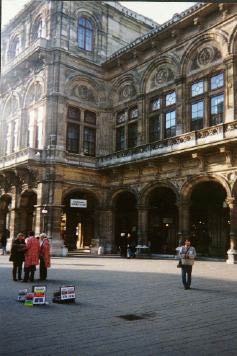St.
Stephan's Cathedral
The
Graben shopping street and two famous cake shops
The
State Opera House
Hapsburg
Palaces
|
Nights at the Opera in Vienna
by Tim Young
From SIF Satellite #53, Spring 1999
 |
| Mioko in front of the Staatsoper, above, with the "Mozart-like people" (closeup below). |
|
|
What comes to mind when you think about Vienna? St. Stephan's Cathedral? Hapsburg palaces? The Lipizza stallions? Rich food?
For many, Vienna is, first and foremost, a city of music. The musical history of Vienna in the 18th and 19th centuries presents us with a "who's who" of European classical music: names like Mozart, Beethoven, Gluck, Schubert, Berlioz, Wagner, on and on. It is home to the Staatsoper, a world-renowned opera house with performances all year round.
So what better place to go for the tourist with a taste for opera? Ozaki Mioko and Kaneko Akiko, during their New Year's '98 stay in Vienna, attended three operas: Mozart's "The Magic Flute," Puccini's "Tosca," and Johann Strauss' "Die Fledermaus," as well as a ballet.
The original Staatsoper, or State Opera House, opened May 25, 1869, with a performance of Mozart's "Don Giovanni." However, that building was destroyed by a World War II bombing in March, 1945. The current building had its opening November 5, 1955, with Beethoven's "Fidelio." The Staatsoper's web site says that Erich Boltenstern's design for the new building, which won a 1948 competition for reconstruction of the opera house, "with its subdued classicism came closest to the original design, but does not ignore modern trends."
When you go to the Staatsoper, as Mioko showed me, you will see "Mozart-like people selling tickets" in front of the building. Entering the building, she saw white marble columns with gold carvings on them. A brown-carpeted stairway was straight ahead, which shortly diverged into one staircase each to the left and right, leading to the balconies. Detailed paintings covered the wall and ceiling.
"You must check your coat at the door," Mioko explains. "If you go into the theater with your coat, they tell you to go back and check it." Why? "So the coat-check person can get a tip!"
Viennese see attending the opera as a major form of socializing, Mioko explained. One could even compare it to karaoke in the Japanese context as a popular social and recreational activity. And if you stand in the balcony, it beats karaoke for affordability.
"I thought that's very good there," Mioko says, "because if you watch the opera standing, it's very cheap, around 20 schillings, so 200 yen! You have to stand, but you can see quite well because the opera house is not very big, and the balcony slopes down, and is fairly near the stage, so from every part you can see the stage very well.
"So it's a very good system because you can enjoy seeing opera without spending so much money like in Japan," she continues. "And the stage art is very gorgeous. For example, in 'Fledermaus' there is a scene of a party, and part of the party is outside of the house, and they move inside the house, and in that scene the stage actually rotates, and the stage set is very gorgeous. And also the orchestra is playing and the singers are also very good and the clothes are gorgeous."
Since many Japanese enjoy European opera, it's not surprising that Mioko saw a number of other Japanese there. The programs for most of the performances she saw, however, had little Japanese written in them. "They only say 'do not take pictures' in Japanese--the story is written in English. Well, I think 'Tosca' is very popular among Japanese people because that was the only program that had the story in Japanese. But Fledermaus and Magic Flute didn't have the story in Japanese--only in English, German, and French.
On one occasion, after Akiko had headed back to Japan, Mioko did take a front row seat. "I was standing in the line to see 'Magic Flute' from the balcony, but two Japanese girls came to me and said they had a ticket in the front row, but they had to go back to Japan on that day, suddenly, so they wanted me to buy that ticket. So I bought that one, it cost about \29,000. It was very expensive, but I thought maybe I won't get to sit in the front row anymore, so I thought it's a good thing for memory. But it's very wonderful to see in front of the stage. It's like the actors were singing for me!" she laughs.
The view from the center of the balcony is quite good, but from the side balconies of the U-shaped theater only part of the stage is visible, Mioko explains. It's possible to reserve yourself a good view by going early and placing a scarf over the bar in front of the area you want to reserve. Of course, since everyone is standing, it's sometimes possible to shift your location later on. "When I was at Fledermaus, there was a Chinese American near me, and he said he couldn't see very well at his seat. I was at the center, so he moved from there to the center.
"He said he lives in Munich, and Munich is a very good place so maybe one night is not enough to see. So I decided to stay in Munich two nights, and two nights in Salzburg." She left Vienna for Salzburg January 2. "Salzburg was a very small city, so there were not many things to see." It was the wrong time of year to attend Salzburg's summer music festival.
Salzburg is the birthplace of Wolfgang Amadeus Mozart (1756-1791). The house where he was born, of course, is now a museum. While Mioko says the building is pretty much the way it was in Mozart's day, I couldn't help commenting that the lettering on the side of the building reading "Mozart's Birthplace" was probably not there in the 18th century.
A musical genius, Mozart spent much of his childhood touring Western Europe, and only lived in Salzburg intermittently. As an adult, he could not always get work in Salzburg, and had to go where the money was, which mostly meant Vienna. Musicians in those days often worked as freelancers, being commissioned by this king or that nobleman to compose music for a special event. A musician who knew the right people could get appointed to a regular job, such as one in the royal court of Vienna, where Mozart became Chamber Musician in 1787. Mioko recalls reading that Mozart didn't like Salzburg very much, "but for the Salzburg people, Mozart is very important."
Before her departure for Salzburg, Mioko was faced with making the best of New Year's Day in Vienna, when most of the tourist attractions are closed. "So I thought, which places are open on the holiday? And I thought that the cemetery may be open, so I went to the center cemetery, and I visited the tombs of Beethoven, Brahms, and Schubert. They collected those tombs in that place." She says she also saw a grave marked as Mozart's, but was skeptical of its authenticity. Perhaps that doesn't matter; regardless of where these great musicians are buried, their music lives on, in Vienna and around the world.
|




 This page last updated
February 3, 2003
. E-mail Tim
This page last updated
February 3, 2003
. E-mail Tim